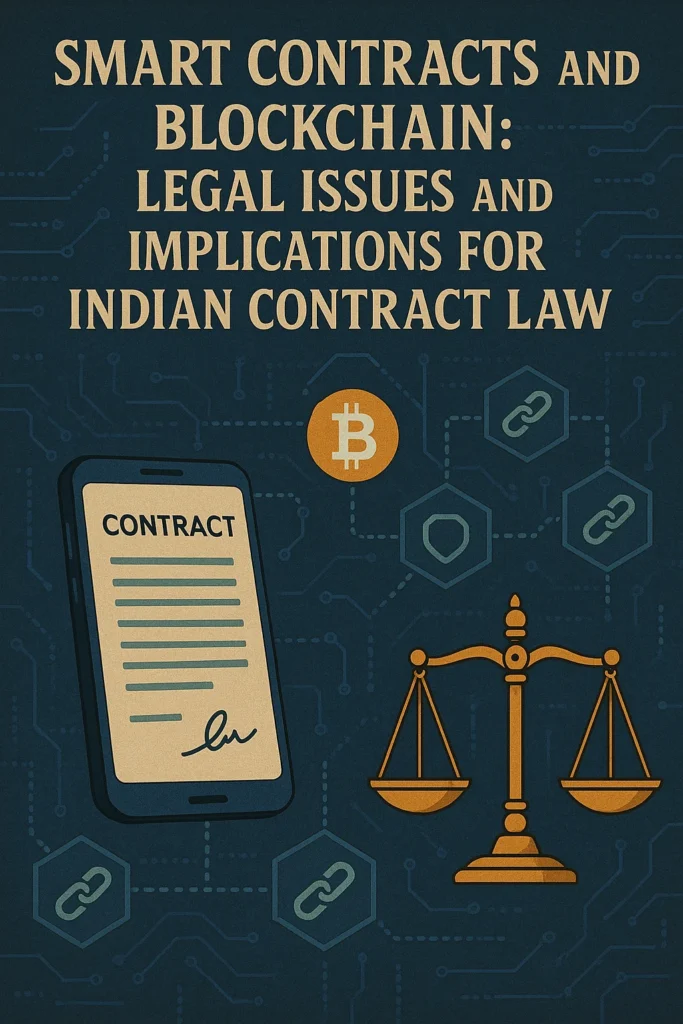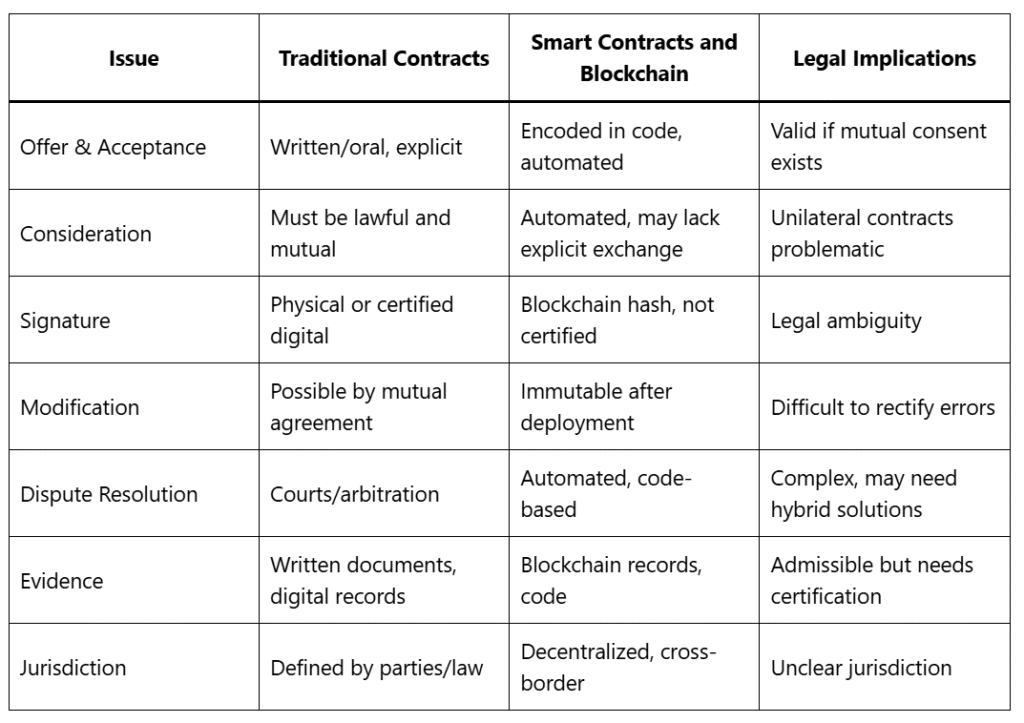Introduction
The digital revolution is transforming how agreements are made, executed, and enforced. At the forefront of this transformation are smart contracts and blockchain—technologies that promise to automate trust, enhance transparency, and reduce transaction costs. However, their integration into the Indian legal system is not without challenges. This comprehensive guide delves deep into the legal issues and implications of smart contracts and blockchain under Indian contract law, offering insights grounded in expertise, authority, and trustworthiness.

Table of Contents
Understanding Smart Contracts and Blockchain
Smart contracts and blockchain are often mentioned together, but each has distinct characteristics:
- Blockchain is a decentralized, immutable ledger technology that records transactions across a distributed network of computers.
- Smart contracts are self-executing agreements with the terms directly encoded into software, running on a blockchain. When predetermined conditions are met, the contract executes automatically.
These technologies eliminate intermediaries, reduce human error, and create a transparent, tamper-proof record of transactions.

The Legal Framework: Smart Contract’s and Blockchain in India
Indian Contract Act, 1872
The Indian Contract Act, 1872, is the foundation of contract law in India. For any contract—including those based on smart contracts and blockchain—to be valid, it must satisfy the following essentials:
- Offer and acceptance
- Lawful consideration
- Free consent of parties
- Lawful object
- Capacity to contract
Smart contracts and blockchain can, in theory, fulfill these requirements if properly coded and executed.
Information Technology Act, 2000
The Information Technology Act, 2000, grants legal recognition to electronic contracts and digital signatures. However, it mandates that digital signatures be certified by government-approved authorities—a requirement that may not align with the decentralized nature of smart contracts and blockchain.
Indian Evidence Act, 1872
Section 65B of the Indian Evidence Act allows electronic records as admissible evidence, but the authenticity and integrity of smart contracts and blockchain records may require technical audits and expert testimony in court.
Key Legal Issues with Smart Contracts and Blockchain
1. Enforceability and Validity
While smart contracts and blockchain offer automation and transparency, their enforceability under Indian law remains a gray area:
- Mutual consent and consideration: Contracts must reflect a genuine agreement and lawful consideration. Automated or unilateral smart contracts without mutual consideration may not be enforceable in Indian courts.
- Immutability: Once deployed, smart contracts on blockchain are difficult to modify, posing challenges if errors or unforeseen circumstances arise.
2. Recognition of Digital Signatures
Indian law requires digital signatures to be certified by government authorities. Blockchain signatures, typically cryptographic hashes, do not currently meet this standard, leading to legal ambiguity for smart contracts and blockchain-based agreements.
3. Dispute Resolution and Jurisdiction
The decentralized nature of smart contracts and blockchain complicates dispute resolution:
- Jurisdiction: Transactions may involve parties from multiple countries, making it difficult to determine which laws apply and which courts have authority.
- Remedies: Automated execution can make it hard to reverse transactions or apply traditional legal remedies if a contract executes unfairly due to a bug or error.
4. Evidence and Admissibility
Presenting smart contract’s and blockchain code as evidence in court is complex. Courts may require expert testimony to authenticate the code and verify its execution, adding a layer of technical complexity to legal proceedings.
5. Data Privacy and Consumer Protection
Smart contract’s and blockchain often process personal data, triggering obligations under the Digital Personal Data Protection Act, 2023. The Consumer Protection Act, 2019, also applies, but enforcement can be challenging due to the decentralized and anonymous nature of blockchain transactions.
6. Regulatory and Compliance Risks
- Lack of standardization: There are no specific regulations for smart contract’s and blockchain in India, leading to uncertainty and potential legal exposure for users and businesses.
- Taxation and anti-money laundering: Gains from blockchain-based assets are taxed, and platforms must comply with KYC/AML regulations.
Smart Contracts and Blockchain: Comparative Table

The Future of Smart Contract’s and Blockchain in India
India is witnessing rapid growth in the adoption of smart contract’s and blockchain, especially in fintech, supply chain, and government services. However, the legal landscape is still evolving.
Government Initiatives
The Indian government has shown interest in leveraging blockchain for governance, financial inclusion, and digital identity. Initiatives like SBI’s BankChain and pilot projects in land records and supply chain management signal a positive outlook for smart contracts and blockchain.
Regulatory Outlook
- Legal reforms: Amendments to the Indian Contract Act and IT Act may be necessary to explicitly recognize and regulate smart contracts and blockchain.
- Hybrid contracts: Combining coded smart contracts with traditional legal agreements specifying governing law and dispute resolution can mitigate risks.
- Technical audits: Engaging legal and technical experts to review smart contract code is crucial for compliance and risk mitigation.
Market Trends
The Indian fintech blockchain market is projected to grow significantly, driven by the increasing adoption of smart contract’s and blockchain in financial services, digital payments, and decentralized finance (DeFi) platforms. Investment in blockchain startups is also rising, fostering innovation and collaboration between fintech companies and traditional financial institutions.
Challenges Ahead
Despite their potential, smart contracts and blockchain face several challenges:
- Technical complexities: Difficulty in coding legal concepts and limited modification post-deployment.
- Security concerns: Vulnerability to hacking and coding errors.
- Jurisdictional uncertainties: Lack of standardized regulations and international legal framework variations.
- Consumer protection and data privacy: Need for enhanced laws and compliance with data protection regulations.
Recommendations for Stakeholders
- Legal practitioners: Stay updated on technological advancements and evolving legal frameworks for smart contract’s and blockchain.
- Businesses: Conduct thorough due diligence, engage in technical audits, and use hybrid contract models to mitigate legal risks.
- Policymakers: Develop clear, comprehensive regulations for smart contracts and blockchain, focusing on consumer protection, data privacy, and dispute resolution.
- Consumers: Exercise caution when engaging in smart contracts and blockchain transactions, ensuring mutual consideration and understanding the risks involved.
It is intresting to know about IP Law for Startups: The Ultimate Guide to Protecting Your Innovation in India
Frequently Asked Questions (FAQs)
1. Are smart contracts and blockchain legally recognized in India?
Smart contracts and blockchain are not explicitly regulated in India. However, if a smart contract meets the requirements of the Indian Contract Act, 1872—offer, acceptance, lawful consideration, and free consent—it can be considered valid and enforceable. The Information Technology Act, 2000, also recognizes electronic contracts and digital signatures, but blockchain signatures are not yet certified under Indian lawu003ca href=u0022https://vinodkothari.com/wp-content/uploads/2019/06/An-Introduction-to-Smart-Contracts.pdfu0022 target=u0022_blanku0022 rel=u0022noreferrer noopeneru0022u003eu003c/au003eu003ca href=u0022https://blog.ipleaders.in/smart-contracts-and-their-enforceability-in-india/u0022 target=u0022_blanku0022 rel=u0022noreferrer noopeneru0022u003eu003c/au003eu003ca href=u0022https://www.nayalegal.com/contract-law-and-smart-contractsu0022 target=u0022_blanku0022 rel=u0022noreferrer noopeneru0022u003eu003c/au003e.
2. What are the main legal challenges for smart contracts and blockchain in India?
Key challenges include enforceability, recognition of digital signatures, dispute resolution, jurisdictional issues, evidence and admissibility, data privacy, consumer protection, and regulatory uncertaintyu003ca href=u0022https://www.scconline.com/blog/post/2025/03/15/legal-challenges-in-web-3-0-navigating-smart-contracts-daos-and-blockchain-disputes/u0022 target=u0022_blanku0022 rel=u0022noreferrer noopeneru0022u003eu003c/au003eu003ca href=u0022https://nmlaw.co.in/future-of-smart-contracts-in-india/u0022 target=u0022_blanku0022 rel=u0022noreferrer noopeneru0022u003eu003c/au003e.
3. How can disputes involving smart contract’s and blockchain be resolved?
Disputes can be complex due to the decentralized and automated nature of smart contracts and blockchain. Hybrid contracts that specify governing law and dispute resolution mechanisms, as well as online dispute resolution (ODR) platforms, are emerging as potential solutionsu003ca href=u0022https://www.scconline.com/blog/post/2025/03/15/legal-challenges-in-web-3-0-navigating-smart-contracts-daos-and-blockchain-disputes/u0022 target=u0022_blanku0022 rel=u0022noreferrer noopeneru0022u003eu003c/au003eu003ca href=u0022https://nmlaw.co.in/future-of-smart-contracts-in-india/u0022 target=u0022_blanku0022 rel=u0022noreferrer noopeneru0022u003eu003c/au003e.
4. Do smart contracts and blockchain comply with data privacy laws in India?
Smart contracts and the blockchain must comply with the Digital Personal Data Protection Act, 2023, when processing personal data. Compliance can be challenging due to the immutable and transparent nature of blockchain recordsu003ca href=u0022https://www.scconline.com/blog/post/2025/03/15/legal-challenges-in-web-3-0-navigating-smart-contracts-daos-and-blockchain-disputes/u0022 target=u0022_blanku0022 rel=u0022noreferrer noopeneru0022u003eu003c/au003eu003ca href=u0022https://nmlaw.co.in/future-of-smart-contracts-in-india/u0022 target=u0022_blanku0022 rel=u0022noreferrer noopeneru0022u003eu003c/au003e.
5. What is the future outlook for smart contracts and blockchain in India?
The future is promising, with increasing adoption in fintech, supply chain, and government services. However, clear regulations, legal reforms, and technical advancements are needed to fully realize the potential of smart contracts and blockchain in Indiau003ca href=u0022https://www.techsciresearch.com/report/india-fintech-blockchain-market/24771.htmlu0022 target=u0022_blanku0022 rel=u0022noreferrer noopeneru0022u003eu003c/au003eu003ca href=u0022https://zebpay.com/in/blog/blockchain-in-india-government-initiatives-and-future-prospectsu0022 target=u0022_blanku0022 rel=u0022noreferrer noopeneru0022u003eu003c/au003e.
6. Can smart contracts and blockchain replace traditional contracts?
While smart contracts and blockchain offer efficiency and automation, they may not fully replace traditional contracts, especially for complex agreements requiring nuanced legal interpretation and flexibility. A hybrid approach combining both models is likely to prevailu003ca href=u0022https://nmlaw.co.in/future-of-smart-contracts-in-india/u0022 target=u0022_blanku0022 rel=u0022noreferrer noopeneru0022u003eu003c/au003e.
7. Are gains from smart contracts and blockchain transactions taxable in India?
Yes, gains from blockchain-based assets and smart contract transactions are taxable. Platforms must comply with KYC/AML regulations, and clear tax guidelines are needed for smart contracts and blockchain activitiesu003ca href=u0022https://www.scconline.com/blog/post/2025/03/15/legal-challenges-in-web-3-0-navigating-smart-contracts-daos-and-blockchain-disputes/u0022 target=u0022_blanku0022 rel=u0022noreferrer noopeneru0022u003eu003c/au003eu003ca href=u0022https://www.techsciresearch.com/report/india-fintech-blockchain-market/24771.htmlu0022 target=u0022_blanku0022 rel=u0022noreferrer noopeneru0022u003eu003c/au003e.
8. What precautions should parties take when using smart contracts and the blockchain?
Ensure mutual consideration and lawful object in the contract.u003cbru003eUse hybrid contracts specifying governing law and dispute resolution.u003cbru003eEngage in technical audits and due diligence.u003cbru003eStay updated on regulatory developments and compliance requirements.
Smart contracts and the blockchain are revolutionizing the Indian legal and commercial landscape. As India moves towards a digital economy, stakeholders must navigate the evolving legal framework with caution, expertise, and adaptability. With the right reforms, smart contracts and blockchain can unlock unprecedented opportunities for transparency, efficiency, and trust in Indian commerce and law.
[…] for a shared future. Have you ever wondered how wide are the Uses of Research Public and Private or Smart Contracts and Blockchain: Legal Issues and Implications for Indian Contract Law could be a great field of […]